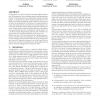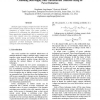5 search results - page 1 / 1 » A sink-n-hoist framework for leakage power reduction |
EMSOFT
2005
Springer
13 years 10 months ago
2005
Springer
Power leakage constitutes an increasing fraction of the total power consumption in modern semiconductor technologies. Recent research efforts have tried to integrate architecture...
DATE
2008
IEEE
13 years 10 months ago
2008
IEEE
Leakage power is a serious concern in nanometer CMOS technologies. In this paper we focus on leakage reduction through automatic insertion of sleep transistors for power gating in...
CODES
2008
IEEE
13 years 10 months ago
2008
IEEE
Adaptive Body Biasing (ABB) is a popularly used technique to mitigate the increasing impact of manufacturing process variations on leakage power dissipation. The efficacy of the ...
ICCD
2002
IEEE
14 years 1 months ago
2002
IEEE
Multiple supply voltages, multiple transistor thresholds and transistor sizing could be used to reduce the power dissipation of digital blocks. This paper presents a framework for...
ICCAD
2009
IEEE
13 years 2 months ago
2009
IEEE
Decoupling capacitance (decap) is an efficient way to reduce transient noise in on-chip power supply networks. However, excessive decap may cause more leakage power, chip resource...


